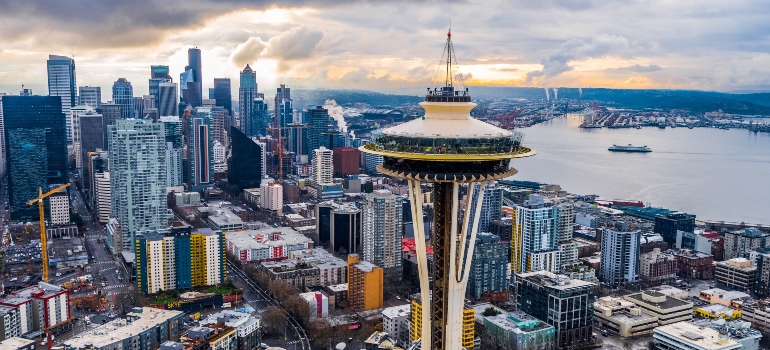Guide to Moving From Marysville to Seattle
While the 35-mile distance may seem small after moving from Marysville to Seattle, the differences in lifestyle, cost of living, and daily routines can be significant. Your commute, expenses, and even grocery shopping habits will change. Seattle offers opportunities that Marysville doesn’t, but those benefits come with trade-offs. Traffic congestion, parking restrictions, and higher expenses require careful planning. At the same time, Seattle provides access to top employers, a thriving cultural scene, and diverse neighborhoods suited to different lifestyles. Here’s how to manage the move with a clear strategy and the best movers Seattle can offer. Instead of treating it as a simple change of address, think of it as a shift in how you live, work, and get around!
From Suburban Serenity to Urban Hustle: Preparing for the Change
Moving from a suburban town like Marysville to a major city requires both logistical and mental adjustments. The daily routines, transportation methods, and even social interactions will feel different. Instead of expecting a seamless move, it helps to anticipate and plan for these changes.
Smaller Living Spaces and Higher Costs
Seattle’s housing market is vastly different from Marysville’s. In Marysville, homes are more spacious, often with garages, driveways, and backyards. Seattle, in contrast, has a mix of apartments, townhomes, and smaller single-family houses. If you are used to having extra space, downsizing might be necessary.
Another key difference is affordability. Home prices and rent in Seattle are significantly higher than in Marysville. Even a modest apartment in a central neighborhood can cost more than a larger house in Marysville. Before booking one of the best moving companies in Marysville WA, reviewing your budget and deciding what trade-offs you are willing to make is crucial.

Adjusting to a Busier Lifestyle
Seattle operates at a faster pace than Marysville. The city is home to major corporations, universities, and a growing tech industry, making daily life more dynamic. While this means access to more job opportunities, cultural activities, and entertainment, it also means dealing with busier streets, more noise, and a less predictable schedule.
If you thrive on convenience and variety, Seattle’s urban energy can be exciting. However, if you prefer a quieter, more familiar environment, it may take time to adjust. Exploring different neighborhoods can help you find an area that balances the benefits of city life with a community atmosphere.
The Commute Factor: How to Optimize Your Route
Seattle’s traffic congestion is a common challenge, and commuting requires strategic planning. If you’re used to a simple drive around Marysville, getting around Seattle will take more effort. Understanding the best transportation options can save time and reduce stress.
Driving Considerations
Driving in Seattle is not as straightforward as it is in Marysville. I-5, the main route between the two cities, is frequently congested, particularly during morning and evening rush hours. If you plan to drive, consider alternative routes, carpooling, or flexible work hours to avoid peak traffic times.
Parking is another factor to keep in mind before booking moving services in Seattle. Many areas in Seattle have limited street parking, and monthly parking garages can be expensive. If you’re renting an apartment, check whether a parking spot is included in the lease, or be prepared to pay extra for a designated space.
Public Transportation Options
Seattle has a well-connected public transit system, and many residents find that relying on buses, trains, or light rail is more efficient than driving. Key options include:
- Sounder Train: The fastest way to commute from Everett (near Marysville) to Seattle. It avoids highway congestion and provides a reliable alternative to driving.
- Express Buses: Routes like the 510 and 512 offer direct service from Marysville to downtown Seattle. Travel times vary depending on traffic.
- Link Light Rail: While not currently available in Marysville, the system continues to expand, making it easier to get around Seattle without a car.
If you choose to use public transit after moving from Marysville to Seattle, getting an ORCA card will allow seamless transfers between buses, trains, and ferries.
Biking and Walking for Shorter Distances
For those living in central Seattle, biking and walking are common transportation methods. The city has dedicated bike lanes, trails, and a strong biking culture. If you work downtown, a bike-and-transit combination might be the most efficient way to commute. Walking is also an option if you choose to live in a more walkable neighborhood.

Housing Market Realities: Securing the Right Neighborhood
Seattle’s housing market is highly competitive, and finding the right home requires careful planning. Prices are significantly higher than in Marysville, and availability fluctuates depending on demand.
Comparing Housing Costs
Marysville’s real estate market offers affordability and space, with single-family homes priced well below those in Seattle. In contrast, Seattle’s median home prices and rental rates are among the highest in the region. Here’s what to expect:
- A three-bedroom home in Marysville typically costs between $500,000 and $600,000.
- A comparable home in Seattle often exceeds $1 million, especially in desirable neighborhoods.
- One-bedroom apartments in Seattle average around $2,000 per month, while a similar rental in Marysville might be half that price.
The price differences mean that you may need to adjust your housing expectations, whether by downsizing, renting instead of buying, or choosing a less central neighborhood. Careful budgeting, hiring reputable local movers in Seattle, and exploring all available options can help you make the transition more manageable while balancing affordability and convenience.
Choosing the Right Neighborhood
Your neighborhood choice will significantly impact your commute, lifestyle, and expenses. Some of the best options for new Seattle residents include:
- Ballard: A residential area with a suburban feel, parks, and waterfront access.
- Capitol Hill: A dense, walkable neighborhood with restaurants, nightlife, and excellent public transit.
- West Seattle: A quieter option with beach access and a small-town feel.
- Beacon Hill: A more affordable choice with strong community vibes and transit access.
Visiting neighborhoods at different times of the day can help you get a better sense of noise levels, safety, and convenience.
Timing Your Move: When and How to Relocate Efficiently
The time of year you choose for moving from Marysville to Seattle can impact moving costs, housing availability, and ease of transition. Expect this before you call your Washington movers and schedule a relocation:
- Winter (December–February): Lower demand for movers and housing, but rainy and cold conditions can make the process harder.
- Spring (March–May): A good balance of availability and affordability.
- Summer (June–August): The most competitive and expensive moving season. Housing availability is high, but costs peak.
- Fall (September–November): A moderate time to move, with more rental options opening up.
Seattle’s real estate market experiences seasonal fluctuations, and planning ahead can save time and money.
Moving Day Logistics
Seattle’s urban environment presents some challenges for moving day. Many apartment buildings require advance notice for elevator reservations, and parking for moving trucks can be limited. If you’re using a moving company, choosing one familiar with Seattle’s layout can make the process easier. If moving yourself, securing a temporary parking permit for the truck can prevent unexpected fines or towing.
Adjusting to the Cost of Living Shift
Seattle’s cost of living is considerably higher than Marysville’s, affecting housing, groceries, utilities, and entertainment. Planning for these changes in advance can help avoid financial strain. Consider the expense increases in:
- Housing: The biggest financial adjustment, with rents and home prices nearly double those in Marysville.
- Groceries: Specialty markets and organic stores are common but more expensive than big-box retailers.
- Utilities: Energy and water costs are slightly higher, particularly in older apartments.
- Entertainment and Dining: While Seattle offers incredible food and cultural options, frequent dining out can quickly add up.
Using public transit passes can help reduce transportation costs by minimizing gas expenses and avoiding high parking fees in Seattle. For entertainment, exploring free activities such as hiking, visiting parks, and attending community events provides affordable ways to enjoy the city without overspending.
As you can see, adapting to Seattle’s cost structure requires some budgeting adjustments, but finding ways to save in key areas can help make the transition more affordable.

The Job Market & Career Growth: Making the Most of Seattle’s Economy
Seattle’s job market is diverse, with strong opportunities in technology, healthcare, education, and the service industry. If you are moving from Marysville to Seattle for career growth, the city offers access to some of the country’s top employers. However, competition for high-paying jobs can be tough, so having a strategy is essential.
Industries in Demand
Technology dominates Seattle’s economy, with companies like Amazon, Microsoft, Google, and Salesforce hiring thousands of employees each year. If you work in software development, cloud computing, or AI, the job market is particularly strong.
Healthcare is another leading industry, with major employers such as UW Medicine, Swedish Medical Center, and Kaiser Permanente offering stable careers in medical and administrative roles. The education sector, led by institutions like the University of Washington and Seattle Public Schools, also provides opportunities for teachers, researchers, and administrative staff.
For those in the service industry, Seattle’s restaurant, retail, and hospitality sectors are constantly hiring. While wages in these fields have increased due to the city’s higher minimum wage, the cost of living still requires careful financial planning.
Networking and Job Searching
Finding a job in Seattle often requires networking, as many positions are filled through connections before they are posted publicly. Attending industry meetups, joining professional organizations, and using LinkedIn and local job boards can improve your chances of securing a role.
Seattle also has a strong culture of remote and hybrid work, making it possible to secure a job that allows flexible work arrangements. Many professionals choose to live in more affordable areas outside the city while commuting a few days a week or working entirely from home.
Adapting to the City’s Unique Lifestyle
Seattle offers a unique blend of urban convenience and outdoor recreation, but adjusting to the city’s culture and lifestyle can take time. Understanding how locals navigate daily life can help you settle in faster.
Grocery Shopping Without a Car
If you are used to driving to large supermarkets in Marysville, shopping in Seattle may require a shift in habits. While Safeway, QFC, and Trader Joe’s have locations throughout the city, parking can be difficult in some neighborhoods. Many residents rely on grocery delivery services like Instacart and Amazon Fresh or shop at smaller, local markets within walking distance. If you prefer bulk shopping, Costco and WinCo are still available, but they are located farther from the city center.
Dining and Coffee Culture
Seattle is known for its food and coffee scene, with independent cafes and restaurants on nearly every block. While dining out frequently can get expensive, many restaurants offer happy hour specials and lunch deals that provide more affordable options. Exploring the city’s food scene while balancing a budget can be a great way to connect with your new surroundings. Seattle’s coffee culture is also distinct, with local roasters.
Sustainability and Environmental Awareness
Seattle has a strong commitment to sustainability and environmental responsibility, which affects everything from recycling and composting laws to transportation choices. The city enforces strict recycling regulations, and many apartments and homes have designated compost bins. If you drive, choosing a fuel-efficient or electric vehicle can help with parking incentives and reduce costs.

Navigating Seattle’s Bureaucracy & Local Policies
Moving from Marysville to Seattle with HB move management is easy; settling in comes with a few administrative tasks, including updating documents and understanding local regulations.
Seattle’s Recycling & Composting Rules
Seattle has strict waste management laws, and failure to comply can result in fines. Most homes and apartments are required to separate recycling, compost, and trash, with composting being mandatory for food scraps. Understanding how to sort waste properly can help you avoid issues with landlords or the city.
Tenant Rights and Renting in Seattle
Seattle has strong tenant protections, including limits on security deposits, eviction laws, and rent increase regulations. If you are renting, knowing your rights can help you navigate leases and avoid common rental pitfalls. The Seattle Department of Construction & Inspections (SDCI) offers resources to help tenants understand local policies.
Driver’s License & Vehicle Registration
If you plan to drive in Seattle, you will need to update your driver’s license and vehicle registration within 30 days of moving. The Washington State Department of Licensing (DOL) has locations throughout the city, but wait times can be long, so scheduling an appointment in advance is recommended.
Brewing a New Life in Seattle
Moving from Marysville to Seattle is a significant adjustment, but with the right preparation, the transition can be smooth and rewarding. While Seattle’s higher cost of living, traffic congestion, and housing challenges require planning, the city also offers exceptional job opportunities, a vibrant cultural scene, and access to world-class outdoor activities.
Understanding your commuting options, choosing the right neighborhood, and adjusting to the lifestyle differences will help you settle in more easily. If you plan to take advantage of Seattle’s public transit, job market, and social opportunities, you can make the most of your move and embrace everything the city offers.
Why Choose Us
History
Hansen Bros. Moving & Storage is locally owned and operated by the same family for four generations, since 1890. We have a well-established reputation for service quality and reliability with a high percentage of repeat household and commercial clients.
Professionalism
We’re a certified ProMover by the American Moving and Storage Association with A+ rating with the Better Business Bureau, voted “Best in Western Washington” in 2009 and from 2011 to 2016 by KING5. Our company is fully licensed and insured and member of WMC and AMSA.
Value
Hansen Bros. Moving & Storage provide free, no-obligation in-home estimate and competitive rates, including low minimum rates for shipments moving under 300 miles. We’ve set a refund policy for unused packing materials and three Puget Sound locations to help clients save on travel fee costs.



